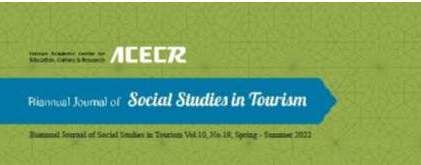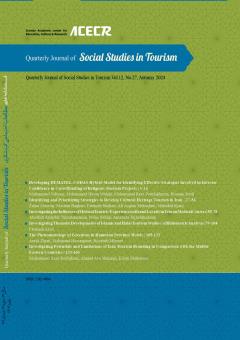Phenomenology of Greenism in Hamedan Province Hotels
Subject Areas :
Arash Zinati
1
![]() ,
Mahmoud Hassan Pour
2
*
,
Mahmoud Hassan Pour
2
*
![]() ,
Roozbeh Mirzaei
3
,
Roozbeh Mirzaei
3
![]()
1 - M.A Student in Tourism Marketing Management, University of Mazandaran, Babolsar, Iran.
2 - Assistant Prof. in Tourism Management, University of Mazandaran, Babolsar, Iran.
3 - .Assistant Prof. in Tourism Management, University of Mazandaran, Babolsar, Iran
Keywords: Tourism, Green hotel, Greenism, Phenomenology, Hamedan province,
Abstract :
There is a growing tendency to judge businesses based on their social and environmental responsibility. Hotels are among businesses that are seeking out legitimacy within their social milieu. Research findings show that an increasing number of tourists are willing to select hotels that act more responsibly towards the environment, the so-called ‘green hotels’. It is expected that Iranian hotels will begin to think about a transition towards green hotels. The main aim of the present study is to provide an in-depth description of hotels’ tendency to become environment-friendly in Hamedan province, western Iran. Our study of greenism follows a phenomenological method with a descriptive-interpretive approach. The population of the study consists of the 17 hotels in Hamedan province. Semi-structured interviews were conducted with the managers of eight of these hotels. The interviews contained five general questions. They were keyed in and coded in MAXQDA 2020 software package for qualitative analysis. Finally, three main categories as well as several secondary categories were identified and a conceptual model was developed. The findings suggest that the phenomenon of greenism in the hotels of Hamedan province is actively practiced in terms of supply and remarkable measures have been taken in this regard. However, there is little demand on the part of clients. The phenomenon of greenism in the hotels of this region essentially revolves around saving and reduction of costs.
امینیان، مقداد، روشنایی، بهاره، مدنی، آزاده، روزبان، حمیدرضا، مراغه، امید. (1394). «دانش در رابطه با هتلسبز و رفتار اقامت توریستی (مورد مطالعه: هتل سبز نیاسر)». کنفرانس جهانی افقهای نوین در علوم انسانی، آینده پژوهی و توانمندسازی،
بابایی، مهدی، آیتی مهر، محمد و محمودی، ادریس (1401). «مروری بر تعاریف، انواع و اشکال پدیده سبزشویی». هفتمین همایش ملی پژوهشهای نوین در مدیریت ، اقتصاد و حسابداری ایران.
بودلایی، حسن (1398). روش تحقیق پدیدارشناسی. تهران: اندیشه احسان.
پایگاه اینترنتی اداره کل میراث فرهنگی، گردشگری و صنایع دستی استان همدان (1402). برگرفته از پایگاه اینترنتی: https://hamedan.mcth.ir/
پورسعید، محمدمهدی، زارع، رحیم، سلطانی نژاد، نیما، عابدینی، علی(1398). « گردشگری علمی؛ فهم پدیدارشناسانۀ تجربه زیسته گردشگران خارجی دانشگاههای ایران». مطالعات مدیریت گردشگری، 48(14)، 91-116.
جامعه هتلداران ایران (1402). «جامعه هتلداران ایران». برگرفته از پایگاه اینترنتی: http://hoteldaran.com/fa
حسینی زاده هرات، زهرا، معین الدین، محمود وحیرانی، فروغ. (2020). «طراحی و تبیین مدل هتلداری سبز سودآور مبتنی بر استراتژی داده بنیاد». گردشگری و توسعه، 9(4)، 269-284.
رازقی، حسین و خرازیان، بنفشه (1400). سالنامه آماری 1400 وزارت میراث فرهنگی، گردشگری و صنایع دستی؛ پژوهشگاه میراث فرهنگی و گردشگری، تهران
سلیمی، محمدرضا و شرفی، روح انگیز (1394). «بررسی ساختار وابعاد روش تحقیق کیفی پدیدارشناسی». کنفرانس بین¬المللی علوم انسانی، روانشناسی و علوم اجتماعی.
ضیایی، محمود، و رنجبرمتعلق، فرانک. (2013). «سطح تعهد محیطی در هتلهای شهر تهران». مطالعات مدیریت گردشگری، 8(21)، 88-59.
فرهادی نژاد، محسن، صابری، عطیه و باقرنژاد حمزه کلائی، محمد ابراهیم. (2023). «شناسایی و تبیین مصادیق سبزشویی در صنعت هتلداری ایران». مطالعات مدیریت گردشگری، 18(61)، 35-64.
قربانی، مرتضی، امینیان، مقداد، مجدی، نیما، فاتحی، علی. (1394). «مدیریت بازاریابی هتلهای سبز». کنفرانس بین¬المللی مدیریت، اقتصاد و سامانههای مالی.
میر، مصطفی، حسینی مقدم، میترا. (1394). «بررسی و سنجش نگرش مدیران نسبت به بازاریابی و هتلداری سبز (مورد مطالعه: مدیران هتلهای شهر مشهد)». کنفرانس بین¬المللی توسعه با محوریت کشاورزی، محیطزیست و گردشگری.
وثوقی، لیلا، شمسی ماربینی، نرگس. (2016). «ارزیابی عوامل مؤثر بر موفقیت اقامتگاههای سبز». مطالعات مدیریت گردشگری، 10(32)، 87-67.
Abdou, A. H., Hassan, T. H., & El Dief, M. M. (2020). A description of green hotel practices and their role in achieving sustainable development. sustainability, 12(22), 9624.
Agag, G., & Colmekcioglu, N. (2020). Understanding guests’ behavior to visit green hotels: The role of ethical ideology and religiosity. International Journal of Hospitality Management, 91, 102679.
Agarwal, S., & Kasliwal, N. (2017). Going green: A study on consumer perception and willingness to pay towards green attributes of hotels. International Journal of Emerging Research in Management &Technology, 6(10), 16-28.
ASEAN-Secretariat. (2016). ASEAN Green Hotel Standard. Retrieved from: https://asean.org/.
Binus. (2023). BINUS University. Retrieved September 6; 2023 from: https://hotel-management.binus.ac.id/2015/12/08/did-you-know-green-hotel/#:~:text=Green%20hotels%20are%20environmentally%2Dfriendly,Tourism%20Council%20Australia%20(1998)
Chan, E. S., & Wong, S. C. (2006). Motivations for ISO 14001 in the hotel industry. Tourism Management, 27(3), 481-492.
Choi, H., Jang, J., & Kandampully, J. (2015). Application of the extended VBN theory to understand consumers’ decisions about green hotels. International Journal of Hospitality Management, 51, 87-95.
Efstathios, V., & Vassilios, G. (2012). Environmental management in the Greek Hotel industry. Survey in the hotels of the Dodecanese islands. Management of International Business and Economics Systems 2012 conference, Larisa GR 25 – 27 Mai 2012.
Eskerod, P., & Đurić, J. (2018). Motivations for and comparisons of green certificates within the hotel industry. Universal Journal of Management, 6(6), 179-189.
Green Hotels Association. (2023). Green Hotels Association. Retrieved September 6; 2023 from: https://greenhotels.com/contactus.php
Han, X., & Chan, K. (2013). Perception of green hotels among tourists in Hong Kong: An exploratory study. Services Marketing Quarterly, 34(4), 339-35.
Hsiao, T.-Y., Chuang, C.-M., Kuo, N.-W., & Yu, S. M.-F. (2014). Establishing attributes of an environmental management system for green hotel evaluation. International Journal of Hospitality Management, 36, 197-208.
Ijasan, K., Ajibola, O., & Gaibee, K. (2016). The Case For Green Hotels: An Investigation Into The Outlook Of South African Business Travellers. International Journal of Applied Environmental Sciences, 11, no3,16.
Kasim, A. (2004). Socio-environmentally responsible hotel business: Do tourists to Penang Island, Malaysia care? Journal of hospitality & leisure marketing, 11(4), 5-28.
Knowles, T., Macmillan, S., Palmer, J., Grabowski, P., & Hashimoto, A. (1999). The development of environmental initiatives in tourism: responses from the London hotel sector. International Journal of Tourism Research, 1(4), 255-265.
Lee, J.-S., Hsu, L.-T., Han, H., & Kim, Y. (2010). Understanding how consumers view green hotels: how a hotel's green image can influence behavioral intentions. Journal of sustainable tourism, 18(7), 901-914.
Luo, J. M., Chau, K. Y., Fan, Y., & Chen, H. (2021). Barriers to the implementation of green practices in the integrated resort sector. SAGE Open, 11(3), 21582440211030277.
Mak, A. H., & Chang, R. C. (2019). The driving and restraining forces for environmental strategy adoption in the hotel industry: A force field analysis approach. Tourism Management, 73, 48-60.
Mbulu, Y. P., & Gunadi, I. M. A. (2018). Green Hotel and Its Implementation in Indonesia (Case Study: Aston Hotel & Resort Bogor, Neo Hotel, and Fave Hotel). 2nd International Conference on Tourism, Gastronomy, and Tourist Destination (ICTGTD 2018),
Millar, M., & Baloglu, S. (2008). Hotel guests’ preferences for green hotel attributes. Hospitality Management. 5. https://repository.usfca.edu/hosp/5
Ramchurjee, N. A., & Ramchurjee, E. P. (2018). Tourists becoming increasingly aware of green tourism: Tourist intention to choose green hotels in Bangalore, India. Managing Sustainable Tourism Resources, IGI Global,p219-245.
Scanlan, S. J. (2017). Framing fracking: scale-shifting and greenwashing risk in the oil and gas industry. Local Environment, 22, 1311 - 1337.
T. M., A., Kaur, P., Bresciani, S., & Dhir, A. (2021). What drives the adoption and consumption of green hotel products and services? A systematic literature review of past achievements and future promises. Business Strategy and the Environment, 30(5), 2637-2655.
Yuniati, N. (2021). Green hotel concept and practices in Indonesia. E-Journal of Tourism, 8(2), 184-196.

